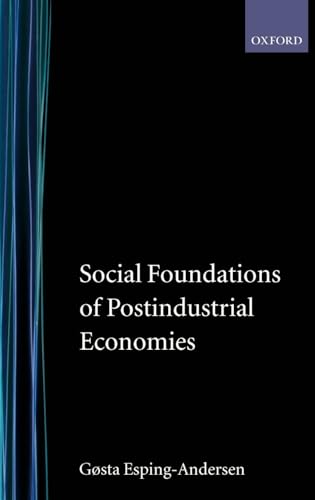Artículos relacionados a Social Foundations of Postindustrial Economies

Sinopsis
The Golden Age of postwar capitalism has been eclipsed, and with it seemingly also the possibility of harmonizing equality and welfare with efficiency and jobs. Most analyses believe that the emerging postindustrial society is overdetermined by massive, convergent forces, such as tertiarization, new technologies, or globalization, all conspiring to make welfare states unsustainable in the future.
Social Foundations of Postindustrial Economies takes a second, more sociological and more institutional, look at the driving forces of economic transformation. What, as a result, stands out is postindustrial diversity, not convergence. Macroscopic, global trends are undoubtedly powerful, yet their influence is easily rivalled by domestic institutional traditions, by the kind of welfare regime that, some generations ago, was put in place. It is, however, especially the family economy that hold the key as to what kind of postindustrial model will emerge, and to how evolving tradeoffs will be managed.
Twentieth-century economic analysis depended on a set of sociological assumptions that, now, are invalid. Hence, to better grasp what drives today's economy, we must begin with its social foundations.
"Sinopsis" puede pertenecer a otra edición de este libro.
Acerca del autor
Gosta Esping-Andersen is Professor of Comparative Social Systems at the University of Trento, Italy
"Sobre este título" puede pertenecer a otra edición de este libro.
EUR 5,75 gastos de envío desde Reino Unido a España
Destinos, gastos y plazos de envíoComprar nuevo
Ver este artículoEUR 5,16 gastos de envío desde Reino Unido a España
Destinos, gastos y plazos de envíoResultados de la búsqueda para Social Foundations of Postindustrial Economies
Social Foundations of Postindustrial Economies
Librería: Better World Books Ltd, Dunfermline, Reino Unido
Condición: Good. 1st Edition. Ships from the UK. Former library book; may include library markings. Used book that is in clean, average condition without any missing pages. Nº de ref. del artículo: 45721642-20
Cantidad disponible: 1 disponibles
Social Foundations of Postindustrial Economies
Librería: Ria Christie Collections, Uxbridge, Reino Unido
Condición: New. In. Nº de ref. del artículo: ria9780198742012_new
Cantidad disponible: Más de 20 disponibles
Social Foundations of Postindustrial Economies
Librería: PBShop.store UK, Fairford, GLOS, Reino Unido
HRD. Condición: New. New Book. Delivered from our UK warehouse in 4 to 14 business days. THIS BOOK IS PRINTED ON DEMAND. Established seller since 2000. Nº de ref. del artículo: L1-9780198742012
Cantidad disponible: Más de 20 disponibles
Social Foundations of Postindustrial Economies
Librería: PBShop.store US, Wood Dale, IL, Estados Unidos de America
HRD. Condición: New. New Book. Shipped from UK. THIS BOOK IS PRINTED ON DEMAND. Established seller since 2000. Nº de ref. del artículo: L1-9780198742012
Cantidad disponible: Más de 20 disponibles
Social Foundations of Postindustrial Economies
Librería: GreatBookPricesUK, Woodford Green, Reino Unido
Condición: New. Nº de ref. del artículo: 1673750-n
Cantidad disponible: Más de 20 disponibles
Social Foundations of Postindustrial Economies
Librería: GreatBookPrices, Columbia, MD, Estados Unidos de America
Condición: New. Nº de ref. del artículo: 1673750-n
Cantidad disponible: Más de 20 disponibles
Social Foundations of Postindustrial Economies
Librería: GreatBookPrices, Columbia, MD, Estados Unidos de America
Condición: As New. Unread book in perfect condition. Nº de ref. del artículo: 1673750
Cantidad disponible: Más de 20 disponibles
Social Foundations of Postindustrial Economies
Librería: GreatBookPricesUK, Woodford Green, Reino Unido
Condición: As New. Unread book in perfect condition. Nº de ref. del artículo: 1673750
Cantidad disponible: Más de 20 disponibles
Social Foundations of Postindustrial Economies
Librería: THE SAINT BOOKSTORE, Southport, Reino Unido
Hardback. Condición: New. This item is printed on demand. New copy - Usually dispatched within 5-9 working days 491. Nº de ref. del artículo: C9780198742012
Cantidad disponible: Más de 20 disponibles
Social Foundations of Postindustrial Economies
Librería: Best Price, Torrance, CA, Estados Unidos de America
Condición: New. SUPER FAST SHIPPING. Nº de ref. del artículo: 9780198742012
Cantidad disponible: 1 disponibles

